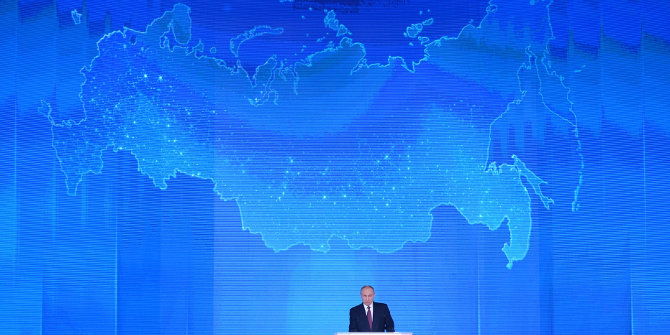The European Parliament election in Romania will be just one of four major elections held in the country this year. Alexandru Damian previews the vote and examines the potential impact of the far right.
This article is part of a series on the 2024 European Parliament elections. The EUROPP blog will also be co-hosting a panel discussion on the elections at LSE on 6 June.
Far-right parties and populist discourse have become increasingly prominent in Romania in recent years. However, this year’s European Parliament election could see an unprecedented event take place.
A small party, S.O.S. Romania, which has been accused of supporting the Kremlin, could pass the minimum threshold required to enter the European Parliament. Meanwhile, a second party, the Alliance for the Union of Romanians, which bases its appeal on a populist and nationalist discourse alongside anti-EU and anti-Ukraine stances, is set to win around 15-20% of the vote.
The support for these parties partly reflects disillusion with the country’s mainstream. The ruling coalition is composed of the two largest parties in Romania, the Social Democratic Party (PSD) and the National Liberal Party (PNL). The coalition is coordinated by Romanian President Klaus Iohannis and was presented to the public as a route to stability and reform in a region affected by Russia’s war against Ukraine.
While the government has taken some sensible decisions externally, such as providing support to Ukraine, it has also demonstrated poor governance within Romania. It has failed to adequately tackle corruption, which has fed populism and the rise of anti-system parties. With both parties facing declining support, some of their members have attempted to compete with the populist challengers, using the EU or Ukraine as scapegoats for political missteps.
The European Parliament elections
Romania has one of the most restrictive electoral systems in the EU. Running in the European Parliament elections requires parties to raise 200,000 signatures, while independent candidates require 100,000 signatures. What is worse is that these signatures must be collected by hand, rather than digitally. The electoral threshold is also among the highest in the EU, with parties needing to surpass 5% of the vote and independent candidates being given an equivalent threshold based on turnout. The redistribution of votes follows the D’Hondt method.
All of this favours large parties with significant resources and party bureaucracies. Significant political subsidies from the state budget have also allowed larger parties to buy publicity worth millions of euros over the last few years. The main beneficiaries have been the members of the ruling coalition, who maintain a strong grip on most TV media, with only independent media or online portals critically analysing their performance.
The government has also decided to bring forward local elections so they can be held on the same day as the European Parliament elections. This move was criticised by both opposition parties and civil society representatives on the basis that it could distort the campaign and inhibit any relevant debate taking place about the EU. The decision is also likely to favour the two largest parties at the ballot box.
The parties
The political landscape in Romania essentially features three main competitors. The first is the parties of the governing coalition (the Social Democrats and National Liberal Party), who are running together in the European Parliament election.
The alliance between the two governing parties is projected to receive the highest share of the vote, with around 40-50% of support. However, the move by the two parties to run together in the election is viewed as an attempt to avoid the potentially disastrous scenario of the National Liberal Party running alone and being overtaken by the far-right Alliance for the Union of Romanians.
It is also worth mentioning that President Iohannis, who is associated with the ruling coalition, is seeking to secure either a high-level EU position or the role of Secretary General of NATO. Despite his very low approval rating among the public, he might try to leverage support for the ruling coalition in the European Parliament elections to further this aim.
The second group of competitors is composed of centre-right parties centred around the Save Romania Union (USR), the third-largest party in Romania. This coalition includes former members of the National Liberal Party who rejected the governing coalition, as well as a smaller party, the People’s Movement Party (PMP). The coalition is projected to receive between 15 and 25% of the vote, with support particularly coming from large urban areas.
The centre-right also includes other parties that are not part of this coalition, notably the Renewing Romania’s European Project party, composed of former members of the USR. Other independent candidates on the centre-right are running on pro-green, pro-human rights and anti-corruption platforms.
Finally, there is the group of far-right parties, of which the Alliance for the Union of Romanians ranks as the largest. The party’s main source of support is disillusioned and anti-system voters, primarily among the Romanian diaspora and in smaller urban and rural areas. The other key player on the far right is S.O.S. Romania, which is led by a former member of the Alliance for the Union of Romanians and maintains ties with Russian proxies in Romania.
Additionally, there is the Democratic Alliance of Hungarians in Romania, a Hungarian minority party with strong ties to Hungarian Prime Minister Viktor Orbán and his Fidesz party. The party is likely to maintain its two members of the European Parliament in the 2024 elections.
A large turnout may have an impact on projected vote shares. Historically, large turnouts have tended to work against the Social Democrats. A large vote against the ruling coalition could help either the far-right parties or the USR. The size of the youth vote is also viewed as important, although recent polls show younger voters split equally between the three main groups, with a high number of undecided voters. Finally, the diaspora vote, which largely backed the USR in the last European Parliament elections, appears more willing to support the far right this time round.
Potential impact in Romania
The European Parliament election in Romania is just one of four major elections the country will hold in 2024, with both presidential and parliamentary elections due to be held later in the year. The European vote is not projected to have a major impact, but it will be viewed as a testing ground for the campaigns to come.
While the far-right parties look set to secure a historic result, this success is likely to be contained. The real danger is that by mainstreaming nationalist and populist discourses, trust in the European Union and support for Ukraine could decline. The two parties in the ruling coalition hold some responsibility for this as they have echoed the narratives of the far right when it suits their needs.
A poor performance by the ruling coalition could also lead to internal clashes, particularly within the National Liberal Party, potentially threatening the stability of the government. The likelihood of this scenario is difficult to estimate, however all the decisions taken so far – merging the local and European elections, running as a coalition in the European vote and having common candidates in the local elections in areas dominated by the USR – support the idea of continuity.
At the EU level, far-right representatives elected from Romania will affect the balance of power in the European Parliament. It is, however, highly improbable that Romania will follow in the footsteps of Viktor Orbán and become a difficult partner for Brussels. While some of the largest parties in Romania occasionally flirt with anti-EU rhetoric, they all maintain a pro-EU stance and we are still a long way from a scenario in which a government will feature a far-right party or support a strongly Eurosceptic agenda.
Note: This article gives the views of the author, not the position of EUROPP – European Politics and Policy or the London School of Economics. Featured image credit: Zaharia Bogdan Rares / Shutterstock.com





